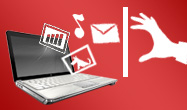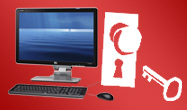PC Learning Center
Support & Drivers

Introduction
A firewall keeps your data safe from Internet hackers that would steal your personal information. With increasing incidents of identity theft and more powerful viruses hitting the Internet every day, a firewall helps keep your data safe and where it belongs—on your computer.
Firewall basics

Firewalls are designed to prevent unauthorized access to a system or network. Like a locked door to your house, firewalls block all but the most determined intruders. A firewall can be a software program you install on your computer and/or network, or it can be a solution made up of both hardware and software.
There are two types of firewalls to consider.
1. Host-based firewalls—software that protects only the computer it is installed on.
2. Network-based firewalls—installed between your DSL or cable modem and your home network to protect all the computers on the network.
When a firewall is installed on a system, all data sent to and from the system is monitored and compared with a set of user-defined security criteria. Any data that does not meet those criteria is blocked.
A firewall at home

Home users rarely need complex firewall systems, and your computer or networking equipment may already have a firewall installed. If not, companies such as Symantec provide simple software firewall solutions that make it easy to protect your computer. Off-the-shelf software that runs between $50 and $100 is usually sufficient to protect most home computers.
The Norton Personal Firewall from Symantec protects your privacy by preventing confidential information from being sent out without your knowledge. Symantec also has an online security check you can use to test your exposure to Internet threats and identify your security needs.
If you have Windows XP running on your computer, you have a firewall on your PC already. Follow these five steps to ensure the firewall is enabled.
1. Click “Start,” then select “Control Panel.”
2. Click “Network and Internet Connections,” and then select “Network Connections.”
3. Under the “Dial-Up,” “LAN” or “High-Speed Internet” category, choose the icon to select the connection you want to help protect.
4. In the task pane on the left, under “Network Tasks,” click “Change settings of this connection.”
5. On the “Advanced” tab, under “Internet Connection Firewall,” make sure the box is checked next to “Protect my computer and network by limiting or preventing access to this computer from the Internet.”
If you have a different version of Windows or a Macintosh, check to see if a firewall is installed. You can do so by checking for firewall programs in your Program Files folder in Windows, or the Applications folder for Mac. If you do not have a firewall installed, use a third-party solution, like those from Symantec. Also, check the manuals of your home networking devices to find out if they include built-in hardware firewalls.
Advanced protection
If you run a business from home and keep records you can't afford to lose, you might want to consider investing in something more extensive. For example, an accountant who has his own personal information and that of clients stored on his computer might find it worthwhile to invest in a firewall and a service to manage it for him.
Beyond firewalls
A firewall is only one line of defense against Internet criminals. To ensure a safe computer, make sure you have virus protection software installed and that you update it frequently. (Read our article on Virus protection for more information.)
You should also make sure to get critical software patches from Windows Update, as well as antivirus software. When you use Automatic Updates in Windows XP, you are installing the available patches you need. See the Microsoft website on Protecting your PC for more information.
Encryption software can add additional protection for your data, making it more difficult for the contents to be accessed should it be intercepted. But, the most important protector of your computer is you. Never, ever give out your system passwords to those you don't know and trust.